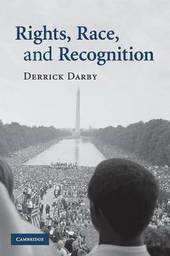
|
Rights, Race, and Recognition
Paperback / softback
Main Details
| Title |
Rights, Race, and Recognition
|
| Authors and Contributors |
By (author) Derrick Darby
|
| Physical Properties |
| Format:Paperback / softback | | Pages:208 | | Dimensions(mm): Height 224,Width 152 |
|
| Category/Genre | Social and political philosophy |
|---|
| ISBN/Barcode |
9780521733199
|
| Classifications | Dewey:323.01 |
|---|
| Audience | | Professional & Vocational | |
|---|
| Illustrations |
Worked examples or Exercises
|
|
Publishing Details |
| Publisher |
Cambridge University Press
|
| Imprint |
Cambridge University Press
|
| Publication Date |
2 April 2009 |
| Publication Country |
United Kingdom
|
Description
What is the source of rights? Rights have been grounded in divine agency, human nature, and morally justified claims, and have been used to assess the moral status of legal and customary social practices. The orthodoxy is that some of our rights are a species of unrecognized or natural rights. For example, black slaves in antebellum America were said to have such rights, and this was taken to provide a basis for establishing the immorality of slavery. Derrick Darby exposes the main shortcomings of the orthodox conception of the source of rights and proposes a radical alternative. He draws on the legacy of race and racism in the USA to argue that all rights are products of social recognition. This bold, lucid and meticulously argued book will inspire readers to rethink the central role assigned to rights in moral, political, and legal theory as well as in everyday evaluative discourse.
Author Biography
Derrick Darby is Associate Professor of Philosophy, University of Kansas.
Reviews"....Rights, Race and Recognition offers an engaging and stimulating exploration of meta-ethical questions regarding moral rights, and, Darby's inclusion of the use of rights discourse in struggles for racial justice gives his text a political focus and immediacy that is most welcome.... Rights, Race and Recognition offers a rich theoretical landscape to be explored, and I have no doubt that others will find it equally compelling and stimulating. The book should be of interest to all those interested in the ways in which our theorization of rights can impact our political practice to ensure and protect those rights." Michael Monahan, Marquette University, Social Theory and Practice
|